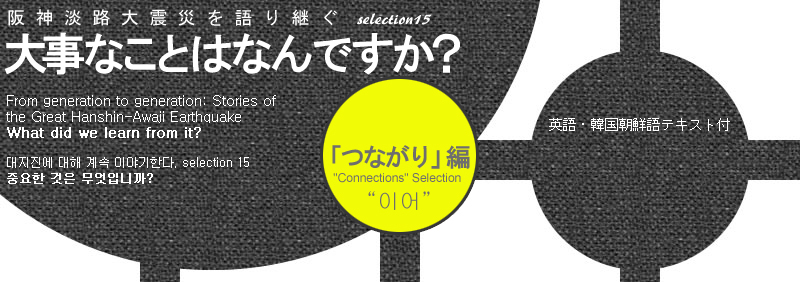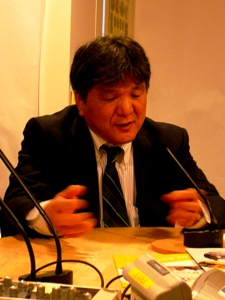Being conscious of ‘a disaster can happen any day’
Kiyokazu MAEBAYASHI – Professor at Kobe Gakuin University
■What is the Interdisciplinary Organization & Disaster Prevention/Social Contribution Unit
This is the only course of its kind where students from 4 departments (Law, Economics, Management, Humanities) who want to enter the course specialize in disaster prevention, volunteer activities and international cooperation for 3 years from their second year. About one-third to a half of the students have experienced the earthquake disaster (Hanshin-Awaji Earthquake). Students who experienced the earthquake disaster were 2 or 3 years old at the time.
■Encountering volunteer activities and disaster prevention
Immediately after the earthquake I went around with a knapsack checking on the safety of my seminar students. After the earthquake, I began doing volunteer and disaster prevention activities with the students. This major disaster was a negative heritage (which we need to learn from). I wanted to pass this on to future generations, Japan and the world, through the lessons from the earthquake disaster and by making an academic system, and to do this I thought the creation of a curriculum was necessary.
Nobody thought an earthquake would happen in Kobe. When you think of it, an earthquake can happen anywhere in Japan. Being prepared on an everyday basis, infrastructurally, materially, systemize, and being consciously aware are important.
■What is learned at the disaster prevention/social service unit
Practical activities are held. Students also receive training in cardiopulmonary resuscitation (CPU) and become qualified instructors and teach junior and senior high school students these skills. Since the junior and senior high school students and the course students are quite close in age, it is easy for them to become familiar with each other. Since the students are teaching others, they study into the early hours of the morning, and this results in a good learning experience for both the course students and junior and senior high students.
■A Win-Win relationship
The students also are involved in activities to aid the disaster areas of Niigata (earthquake disaster) and Sayo (flood disaster). Although they may not be able to do anything significant, their activities act as supporting link, I think. Also, no matter how much you explain or how much you read in books, there are many things you cannot understand about the abnormal situation when a disaster happens. So, going to a disaster-hit area is an important learning experience.
■This is an age when we don’t know when or what will happen
It is important to be conscious of the fact that you have to protect yourself. Learning this on a daily basis, and developing a sense of mutual aid where after protecting yourself you will help those around you are important, and each person should learn this.
■Cooperating with local universities/colleges
The four universities on Port Island, Kobe (Kobe Gakuin University, Kobe Women’s University, Kobe Women’s Junior College, Hyogo University of Health Sciences) coordinate in disaster prevention and health activities. Each university has it own specialty; welfare, medical services and disaster prevention.
■Cooperating with distant universities – Tohoku Fukushi University (Miyagi Pref.), Kogakuin University (Tokyo) –
Though cooperating with local universities and colleges is easy, there is the strong possibility that all will collapse if there is a disaster. However, if there are universities or colleges some distance away, if one college is affected by a disaster, the other two (distant) colleges can assist it. Disaster prevention cannot be studied in just one field of study. Welfare, engineering, humanities /social studies, etc, each university has it own and different speciality. By using the strengths and unique characteristics of each university, comprehensive research and studies are possible. Lectures in each university can be seen on Internet broadcasts. Real time question and answer sessions are also possible. Intensive lectures are given during the summer and winter holidays when students from 3 universities assemble and receive the lectures.
■Japan Society for Social Service and Social Service Activities Support Specialists
The Japan Society for Social Service was established on March 5, 2011. This is not a typical academic society, we hope that many ordinary citizens join it. We would like ordinary citizens to make use of the fruits of the cooperation between the universities, and by doing so will acquire the knowledge, ability and practical skills needed to help each other when a disaster occurs. We have also created a new qualification – the Social Service Activities Support Specialist. This qualification is renewed every 3 years. The qualification is just one tool for activities, actually taking part in activities and learning are important.
■A disaster may happen any time
Prof. Torahiko TERADA (physicist, poet, etc.) 1878-1935 left these famous words, “A disaster strikes when we have forgotten it.” About 400 disasters occur every year throughout the world. If we think of this, disasters happen every day. It is this kind of awareness that is important. Think about what you can do (for example: if you can’t go to the site of the disaster, give or collect donations). Broaden you sense of awareness. Being involved with disasters is important, I believe.

